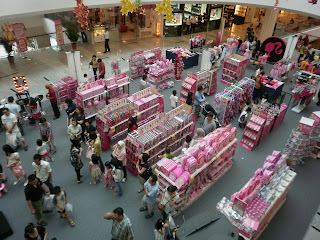Memandangkan sekarang Ziqri dah ada 8 batang gigi...So, aku rasa now is the time to teach him to brush his teeth. Nanti dah besar takde la susah nak suruh dia gosok gigi!
Oleh sebab itu, maka...aku telah membeli berus gigi ini...
Beli kat Isetan, Harganya RM10. Mahal betol regenya! Padahal kecik jer!
*************************************************
The Importance of Baby Teeth
A common question asked by new parents is:
Why should I worry about cavities in baby’s teeth when these teeth will fall out anyway?
There are several reasons why baby teeth should be taken care of from the moment they break through the gums.
1. Baby teeth hold a place and serve as spacers for the permanent teeth. Decay and early loss of these baby teeth can cause loss of space for the permanent teeth, which leads to the permanent teeth shifting and thus leads to orthodontic problems for your child.
2. Healthy baby teeth are important in helping your baby speak clearly and properly.
3. Nice looking teeth are important for your baby’s self-confidence. Missing teeth, decaying teeth or bad breath can lead to your child getting teased by other children.
4. Your baby will need these baby teeth for biting and chewing. Without these teeth, your child might not get the proper nutrition.
Brushing Baby Teeth
Most pediatricians and dentists agree that it’s best to start cleaning your baby’s mouth even before the first teeth start to show. In fact, the American Dental Association suggests that your baby’s mouth should start being cleaned a few days after birth.
The gums and first teeth can be cleaned with a wet cloth, gauze pad or infant toothbrush. While a toothbrush isn’t necessary, it can get your baby in the habit of brushing. If you want to use toothpaste, be sure it’s toothpaste designed for infants. Infant and baby toothpaste is fluoride free and can be swallowed. Since babies aren’t use to spitting toothpaste out and will have a tendency to swallow, this could lead to an overdose of fluoride if adult toothpaste is used.
When brushing baby teeth you want to be soft and gentle. Your baby’s teeth and gums are very soft and delicate, so vigorous brushing is not necessary. It’s also recommended that you brush your baby’s tongue, since it can also carry germs.
While it’s ideal to brush your baby’s teeth after every meal, it’s not always practical. You should at least try to get into a routine where there is a morning and evening cleaning, preferable after meals. The most important time to brush is just before bed. Since the production of saliva decreases during sleep, you will want to make sure your baby has a clean mouth before bedtime. This will prevent bacteria and plaque from lying on and decaying the teeth during the night.
Once you get your baby into a routine of brushing from an early age, he or she can carry this routine into the second and third year when they will want to start brushing themselves. When your child reaches the age when they want to start brushing themselves, let them take over the routine, but continue to keep an eye on them to make sure they are brushing properly.
Baby Bottle Tooth Decay
Each year a large number of infants and young children experience tooth decay from milk, juices and other liquids being given to them in a bottle at bedtime. This decay from milk and juice is called “Baby Bottle Tooth Decay” or “Baby Bottle Mouth”.
When a baby falls asleep, the production of saliva decreases significantly. If a baby is given milk, juice or other sugary liquid and is then put to bed without brushing, the sugar in these liquids along with the bacteria that is naturally present in a baby’s mouth join together to form an acid, which starts attacking and decaying the teeth.
It’s best to get into a routine early and not let your baby fall asleep in the crib with a bottle of milk, juice or other sugary liquid. Prevention is the key to prevent baby bottle tooth decay.
Preventative steps:
* Don’t put your baby to bed for the night with a bottle of milk or juice. Most juices contain natural sugars, while milk contains sugar called lactose, which bacteria can also use to create acid, thus causing the decay.
* Don’t let your baby use a bottle of milk or juice as a pacifier. Lying around all day sucking at will on the bottle can be as harmful to teeth as putting a baby to bed at night with a bottle.
* Don’t give your baby a pacifier that has been dipped in a sugary substance. While this is tempting to parents to try and calm a fussy baby with a sugary pacifier, it can cause a lot of damage.
* Give your baby his or her bottle of milk a little before bedtime. This leaves you time to brush your baby’s teeth before you put him or her down for the night.
* Try to make the last thing your baby drinks at night before bed be plain water.
Source:
ParentsGuide

























































